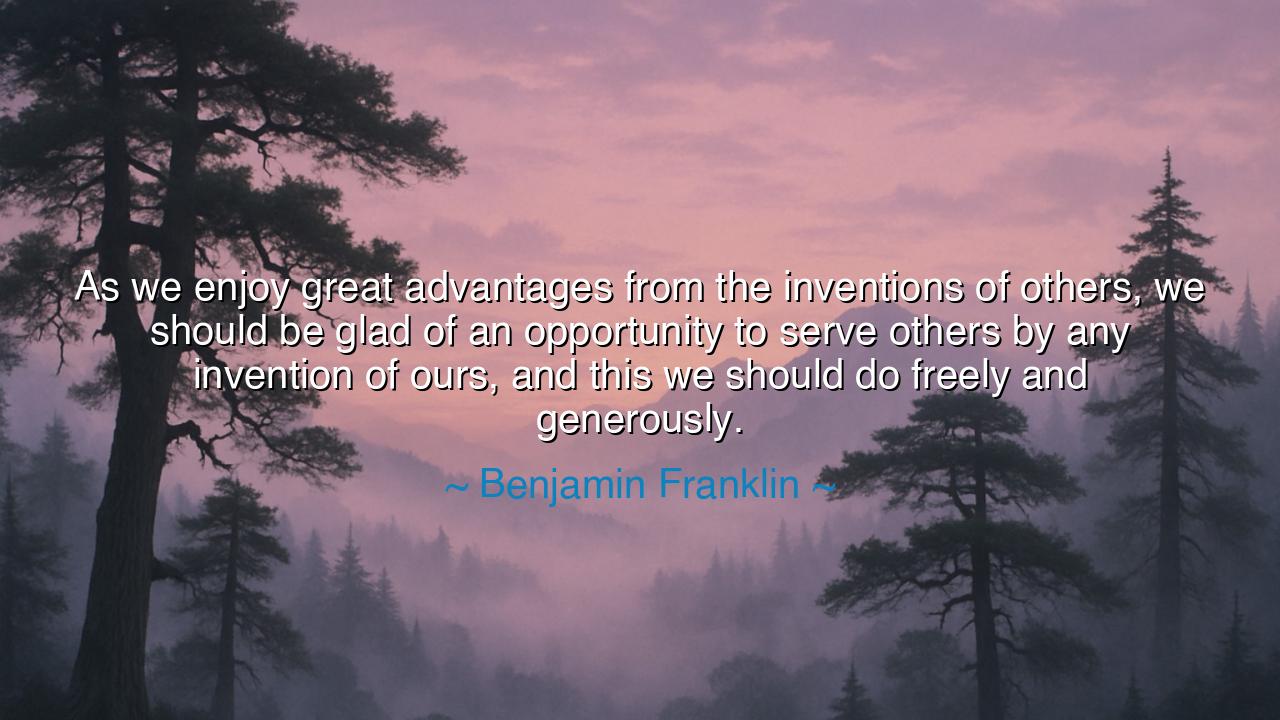
As we enjoy great advantages from the inventions of others, we
As we enjoy great advantages from the inventions of others, we should be glad of an opportunity to serve others by any invention of ours, and this we should do freely and generously.






The immortal Benjamin Franklin, that wise craftsman of both words and worlds, once declared: “As we enjoy great advantages from the inventions of others, we should be glad of an opportunity to serve others by any invention of ours, and this we should do freely and generously.” These words, humble in tone yet vast in meaning, reveal the moral foundation of all true progress. They are a call not merely to invent, but to serve, not merely to create, but to share. In this single sentence, Franklin captured the divine cycle of human advancement — the sacred chain by which each generation builds upon the labors of the last, adding light to light, wisdom to wisdom.
Franklin spoke from experience, not from theory. He himself gave to the world inventions that shaped the course of modern life — the lightning rod, the bifocal lens, the Franklin stove — and yet he refused to patent them, believing that ideas were gifts meant for the common good. “As we enjoy great advantages from the inventions of others,” he said, and indeed he had enjoyed them: the printing press that carried his words, the ships that carried knowledge across oceans, the instruments that guided discovery. From that recognition of debt grew his philosophy of gratitude through giving — the understanding that we repay the past not with gold, but with contribution.
This belief was not mere politeness, but a profound vision of human interdependence. Franklin saw that no invention, no art, no wisdom exists in isolation. Every discovery stands upon countless others — the bridge upon earlier stones, the melody upon earlier notes. To hoard one’s creations, to claim ownership of the world’s progress, was to deny the very spirit that made progress possible. Thus he taught that invention is a trust, not a trophy. To invent freely is to join hands with those unseen generations — both those who came before and those who will come after.
Consider the story of Jonas Salk, the man who developed the polio vaccine in the twentieth century. When asked who held the patent, Salk replied, “There is no patent. Could you patent the sun?” Like Franklin before him, he believed that knowledge meant to heal should not be bound by profit. His invention saved millions, and his generosity restored faith in the idea that science, at its highest form, is a moral act. Here we see Franklin’s wisdom reborn in another age — proof that his teaching is not bound by time, but by the conscience of the human heart.
There is also a spiritual echo in Franklin’s words — the idea that service perfects the soul. To invent for oneself is clever; to invent for others is noble. The greatest minds in history — from Archimedes to Newton, from Galileo to Edison — all became immortal not because they guarded their knowledge, but because they offered it freely to the world. In the act of giving, genius fulfills its purpose. In the act of sharing, wisdom multiplies. Thus Franklin’s teaching is not merely about science or invention, but about the sacred economy of virtue: the more we give, the richer humanity becomes.
But this principle does not belong to inventors alone. Every person, in their own realm, holds a gift — a skill, a kindness, a vision — that can serve others. The teacher who shares her understanding without envy, the craftsman who passes his methods to his apprentice, the parent who teaches compassion to a child — all are part of the same noble chain. To live freely and generously is to recognize that one’s life itself is an invention, a gift shaped by others, and meant to uplift still more.
So let this teaching of Franklin’s be inscribed upon your heart: do not merely receive the gifts of the world — become a giver within it. In every idea, in every act, seek not ownership but usefulness. The true measure of genius is not what it keeps, but what it bestows. Build your house of wisdom with open doors; light your lamp, not for your own table alone, but for travelers yet unseen. For when your work becomes an offering, your life itself becomes a beacon of progress, joining the eternal chorus of those who, through generosity, have made humanity greater than the sum of its parts.






AAdministratorAdministrator
Welcome, honored guests. Please leave a comment, we will respond soon